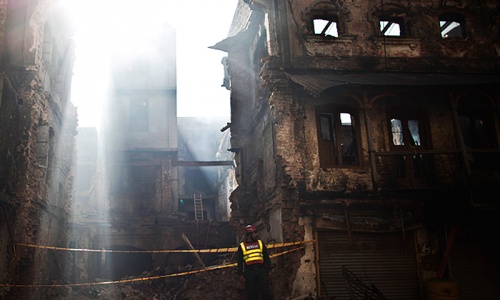The recent violence in Rawalpindi or the bombing of the Iranian embassy in Beirut are not the only manifestations of the intra-Muslim sectarian discord. The inability of Muslims to settle a 7th century dispute is now one of the biggest threats to global peace.
The Sunday Times recently reported that the Saudis and Israelis, being equally wary of a nuclear-armed Iran, were collaborating to stop the country in its nuclear tracks by any means possible. This includes giving Israel access to Saudi airspace to attack Iran. The sectarian differences between the Sunni state of Saudi Arabia and Shia Iran are maturing fast from future plans for armed conflicts to actual sectarian warfare that is already in full-swing in Syria, Iraq, and Lebanon. At the same time, Pakistan and Afghanistan are experiencing the proxy sectarian warfare that has resulted in the deaths of thousands at the hands of violent extremists.
It remains today as one of the oldest and the bloodiest unresolved disputes. The Shia-Sunni schism is no longer a conflict about who should have inherited the leadership after the demise of the Prophet Muhammad (PBUH) but has evolved from being a sectarian divide to a dispute that could see the deployment of nuclear weapons by the unwary and trigger-happy monarchs in the Middle East.
If the Muslims continue to fail in agreeing to disagree peacefully, the world may not leave this conflict to them alone. “Historic compromises between ancient rivals are most likely either when both sides acknowledge a stalemate, or else when some outsider forces them together,” noted The Economist when it concluded that hopes of an intra-Muslim accord were slim.
The unforgivable loss of life on the 10th of Muharram in Rawalpindi is now the subject of a judicial inquiry and hence is no longer suited for journalistic musings. However, a few observations are still in order. First, it was a remarkable failure of the state to prevent the atrocity from happening. A modest level of planning could have kept the two groups apart. Furthermore, when the rioting started and continued for hours, those responsible to enforce the state’s writ were nowhere to be seen.
What transpired in Rawalpindi has its roots in the same sectarian dispute that saw Iran and Iraq battle each other for nearly a decade and one that has plunged Syria into a contagious civil war, which is likely to spread to Lebanon, Jordan, Bahrain, Yemen and even Saudi Arabia.
In a recent interview, Iranian Foreign Minister Mohamed Javad Zarif conceded that the Shia-Sunni schism is a threat to global peace. Zarif warned that “a sectarian divide in the Islamic world is a threat to all of us.” The bombing of the Iranian Embassy in Lebanon came within days of the Iranian minister’s warning to the world about the potential harm that may result from the sectarian divide within Islam. Two suicide bombers, one riding a motorcycle and the other following in a car, targeted the embassy in a calculated attack now being claimed by the Al Qaeda-affiliated group, Abdullah Azzam Brigades.
This is the fourth such attack in Lebanon that is directly related to the ongoing civil war in Syria. The Syrian information minister blamed Saudi Arabia for the attack, saying the bombings “smell of petrodollars”. If Iran or its proxies were to retaliate against Al Qaeda or its backers, the Middle East is likely to go up in smokes, threatening world peace and the global supplies of oil.
While the world’s eyes have been fixated on the civil war in Syria, which began as a political conflict and evolved quickly into a sectarian one, sectarian warfare in Iraq has already claimed 6,500 lives in 2013. Pakistan also continues to experience sectarian violence that routinely targets Shias and followers of liberal strands of Sunni Islam (such as Barelvis). Violence against Ahmadis is even worse where the state is reluctant to offer protection or acknowledge its responsibility. At the same time, religious minorities in Pakistan have been targeted by the same sectarian extremists. The church bombing in Peshawar on Sept 22, which killed over 80 Christian worshippers, is one such example of hate-fuelled, indiscriminate terror.
The Shia-Sunni schism, which has historically been a divisive catalyst amongst Muslims, now threatens to divide the world as global powers are picking sides in the conflicts in Syria, Bahrain, and Lebanon. Robert Fisk warns world leaders to be wary of the extremists in this conflict, especially the Salafists. “Fifteen of the 19 mass-killers of 9/11 were also Salafists” and citizens of Saudi Arabia, warned Fisk. Whereas others, such as Barry Rubin, a Tel Aviv-based journalist and editor, have labelled Iran as a greater threat.
It does not help when most well-meaning Muslims, in their desire to see the conflict resolved, refuse to acknowledge that it even exists. Any attempt for a dialogue on this topic is labelled as an attempt to fan sectarianism, which is unlikely to disappear by merely wishing it away. It will require a collective dialogue among Muslims that has not taken place in the last 1400 years and the world is not likely to wait for them for another millennia to resolve their internal conflicts.














































